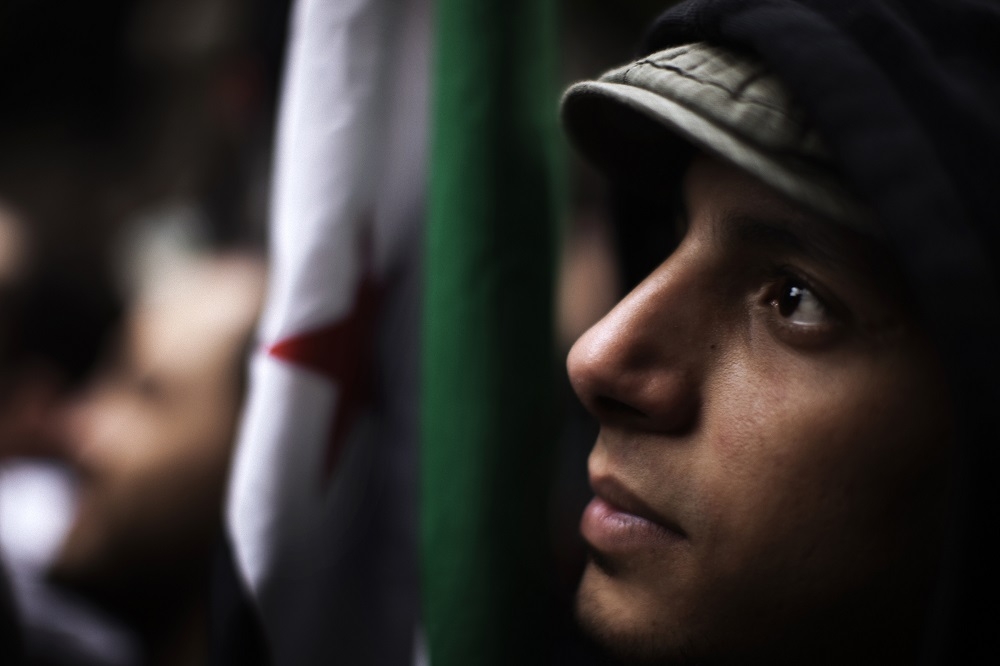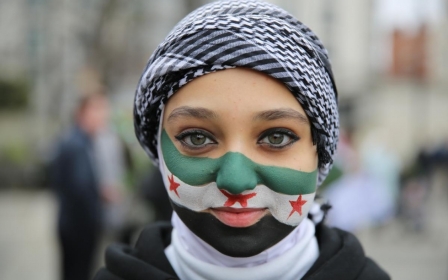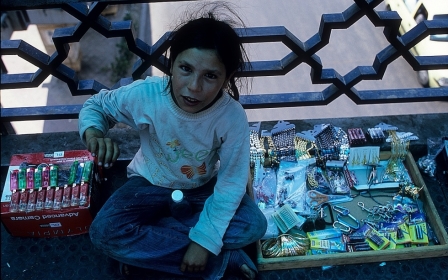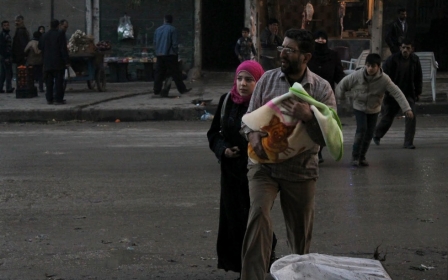‘It was the future’: Syrian refugees remember the revolution

CAIRO - Gaith sits down, lights a cigarette and looks at the television.
The TV usually beams news from Syria on a 24-hour loop into a room overlooking Gaith’s shaabi neighbourhood in Cairo’s Giza, four hundred miles away.
True to form, a channel is showing footage of the first protest of the Syrian revolution ahead of this week’s sombre anniversary. Deraa, in southwestern Syria, March 2011. There is tear gas, and chanting against President Bashar al-Assad. Police are dragging protesters towards Syria’s dungeons.
“That was the first guy to tear down Assad’s picture … in Homs [to the north],” Gaith said with a half-smile, breaking the silence as he stares intensely at the screen. “And that is the first protest of the revolution in Deraa.”
Suddenly, the broadcast cuts to a statement being read by a Saudi official. The revolution has been interrupted. Gaith does not say anything; he simply raises a heartfelt middle-finger at the television.
Some would say we have just watched history - images of a revolution that died a long time ago.
But for the young Syrians who participated in the first two years of the uprising, many of them now in an ever-growing diaspora numbering up to four million people, the reality is different. The Syrian revolution now is not about Daesh (the Arabic acronym for Islamic State), civil war or coalition air strikes. And it is not history.
“It was … the door to heaven,” Gaith laughed, when I ask what the revolution meant to him. “It was the door to the future. [The revolution] was the only way to get your freedom and live as a respectable citizen, to get your rights and … .” He pauses. “It was the future. It is still.”
He goes on: “It’s like you are living in a cage and someone shows you the way to destroy this cage and get your freedom again. And you are already in the cage for nothing - just because there is a crazy man who wants to put all Syrians in this cage; just to stay as a president, to stay in his chair and steal all the country’s money and wealth.”
Gaith remembers watching the Arab Spring sweep through the region. And he immediately believed that it was time for Bashar al-Assad to follow in the footsteps of Tunisia’s Zine El Abidine Ben Ali, Egypt’s Hosni Mubarak and Libya’s Muammar al-Gaddafi. Today he is frustrated that the world has forgotten how it began.
“When the Libyan Revolution began, we started thinking with some friends about how we must make the first protest in my city, As-Suweyda,” a majority Druze city in Syria’s south, not far from Deraa, the city where the Syrian revolution began, supposedly when a group of schoolchildren who scribbled anti-regime graffiti on a wall in the city were arrested.
“We believed that a lot of people wanted to let the regime fall [too],” Gaith says. “I hadn’t imagined that this regime would kill people in this bad way, but when they arrested the children in Deraa, and after what happened there, with [the security forces] torturing them, we started to realise that a lot of violence would come.”
Before long, the protests grew and so too did the violence. Gaith ultimately fled the country in the spring of 2013, when the shabiha (brutal militias known locally as ghosts) tried to force their way into his home. He remembers lying in bed that night, thinking about what to do.
“I felt that there is no one who could help me or support me or protect me from them," he said. “Any time they wanted to hurt you - not just you, your family too - they could.” By then Gaith felt that “the only way to be against the regime was to become a fighter and carry a gun”.
“I couldn’t do that,” he said
Gaith fled to Cairo. There, a group of friends from cities across Syria would come together.
Gradually, those friends have separated, but each has a story of the Syrian diaspora, a temporary existence lived through residency permits and asylum applications, smuggling boats and the conflict between hope for the future and guilt of leaving their home behind.
Lilas had listened to the crackdown on Clock Square in Homs on the first night of the revolution in the city. As an activist-paramedic for one of the revolutionary committees back home in Damascus, Lilas had witnessed the street uprising slowly unravel.
“I thought that I had done everything I could,” she told MEE in September. “Maybe I didn't. Maybe I should have done more. Sometimes I feel guilt, like I should have done more. But I'm not sure I could … it was getting worse.
“More people were being killed, day by day. The demos were crap, they were nothing. If there is a plane in the sky throwing bombs at you, then first-aid is nothing.”
Last summer, Lilas crossed the Mediterranean in a smuggling boat. Speaking by Skype from Europe in the autumn, she remembered the exploitation and lies of the smugglers, how people on board fell into the sea as the Egyptian police almost caught their boat, and the mixed views of the Syria they were leaving behind.
Today, Lilas is in Germany, recently reunited with her family after they were smuggled from Damascus to Turkey and then to central Europe late last year. Lilas’ older brother, Khaled, fled to Turkey in 2014 when the intelligence services arrested his best friend. The family sold their home in Damascus and followed Khaled across the border to Turkey two weeks later.
The family is now learning how to lead a new life in Europe, but after years of suffering Lilas says she feels able to begin again, even if she cannot overcome her sense of guilt.
“Not being in an Arabic country makes you feel more safe … and more guilty,” she said. “You feel like you have a lot of things and others don’t. I don’t just mean Syrians who are in Syria, but even in Egypt. A lot of my friends who are still there, their situation is difficult."
“Otherwise, being [in Germany] is very good. You have everything, no matter what happens. You still have a roof above your head; you have your health insurance; you have someone to pay for your education - everything.”
But Lilas admits there are “difficulties with coping” - integrating into a new community with different customs, traditions and languages - have all proved a challenge that one must try to overcome.
“It’s just a matter of coping - if you can cope with a new society or not. I’m always thinking about the future, that the best is yet to come … not now, but in the near future, I hope,” she said.
Back in Cairo, Gaith also talks about the future. He is planning to leave Egypt with the help of a smuggler, as Lilas did before him.
“If I’m honest with you, I’m living a good life here in Egypt. There are a lot of bad sides - I agree with the Syrians who say this - but it was a good two years. But I’m not just trying to enjoy my life. I have my own responsibilities.”
Gaith wants to finish his education and reunite with his fiancee, who is still in Syria. Egypt was always “just a temporary station,” Gaith said. “I’m just spending my time without achieving anything. This is not enough.”
Leaving is one thing, but Gaith also struggles with the idea of a return. Sometimes, he explains that he feels guilty for leaving; at other he simply doesn’t know what more he could have done.
“I believed in the revolution so much … and I still believe in it. And I wish that I could go back and protest against the regime,” Gaith said . “But … I did what I could.”
Lilas also talks about going back, even though she has come to realise the situation in Syria will take a lot longer to be resolved than she originally expected.
“It’s going to take longer, all of this - the war and everything. I don’t like to call it a war, but that's what it is now.”
She plans to study child psychology in Germany and use that knowledge to help the traumatised, battered youth of Syria.
“The more you feel you are settled, the guiltier you feel. Things inside Syria are getting worse, but your situation is getting better - and that makes it harder to cope, harder to forget the guilt," she said.
“So what can you do? I don’t know. Maybe that’s why I want to go back. Maybe I want to feel like I’m doing something, to stop the guilt.”
Gaith feels the same, but he is unsure how to participate anymore.
“We left the country; we gave up,” he said. “We left Syria to foreign people and extremists and, maybe, we left the revolution and the cause we believed in. I’m doing nothing now for the revolution."
“But, it takes a lot of courage to go back there; to leave your future, your life and your dreams to help people - to take the decision to spend your life on the revolution.”
Still, in the minds of young diaspora Syrians, the revolution has not died. It has left its indelible mark on their lives - even if, for now at least, it seems like more of a memory.
“After everything, how can you forget?” Lilas said. “Some people really just try to forget, but why would you do that? People are still dying in Syria. You can’t just put that aside and go on with your life. It’s not that easy.”
New MEE newsletter: Jerusalem Dispatch
Sign up to get the latest insights and analysis on Israel-Palestine, alongside Turkey Unpacked and other MEE newsletters
Middle East Eye delivers independent and unrivalled coverage and analysis of the Middle East, North Africa and beyond. To learn more about republishing this content and the associated fees, please fill out this form. More about MEE can be found here.




